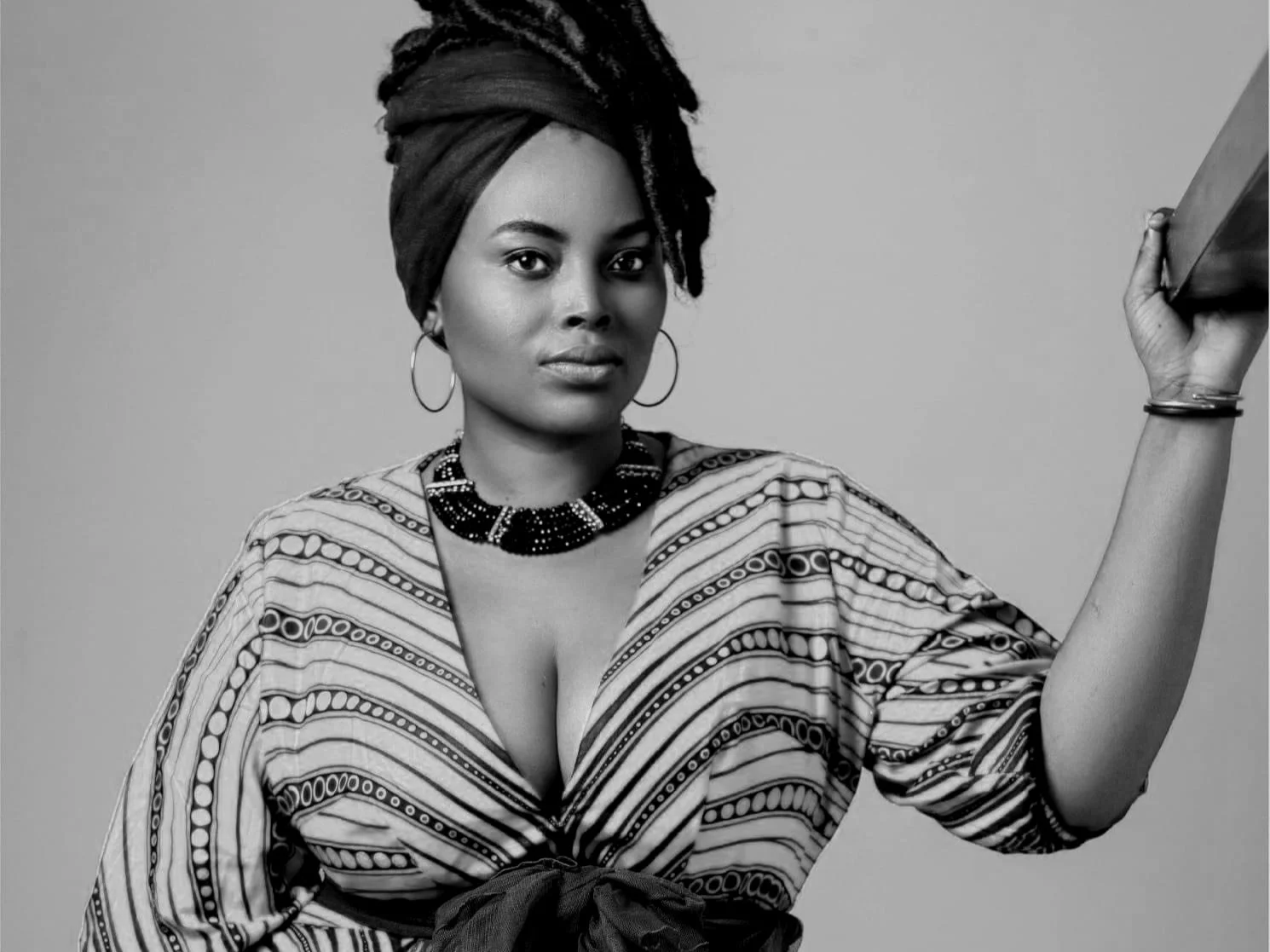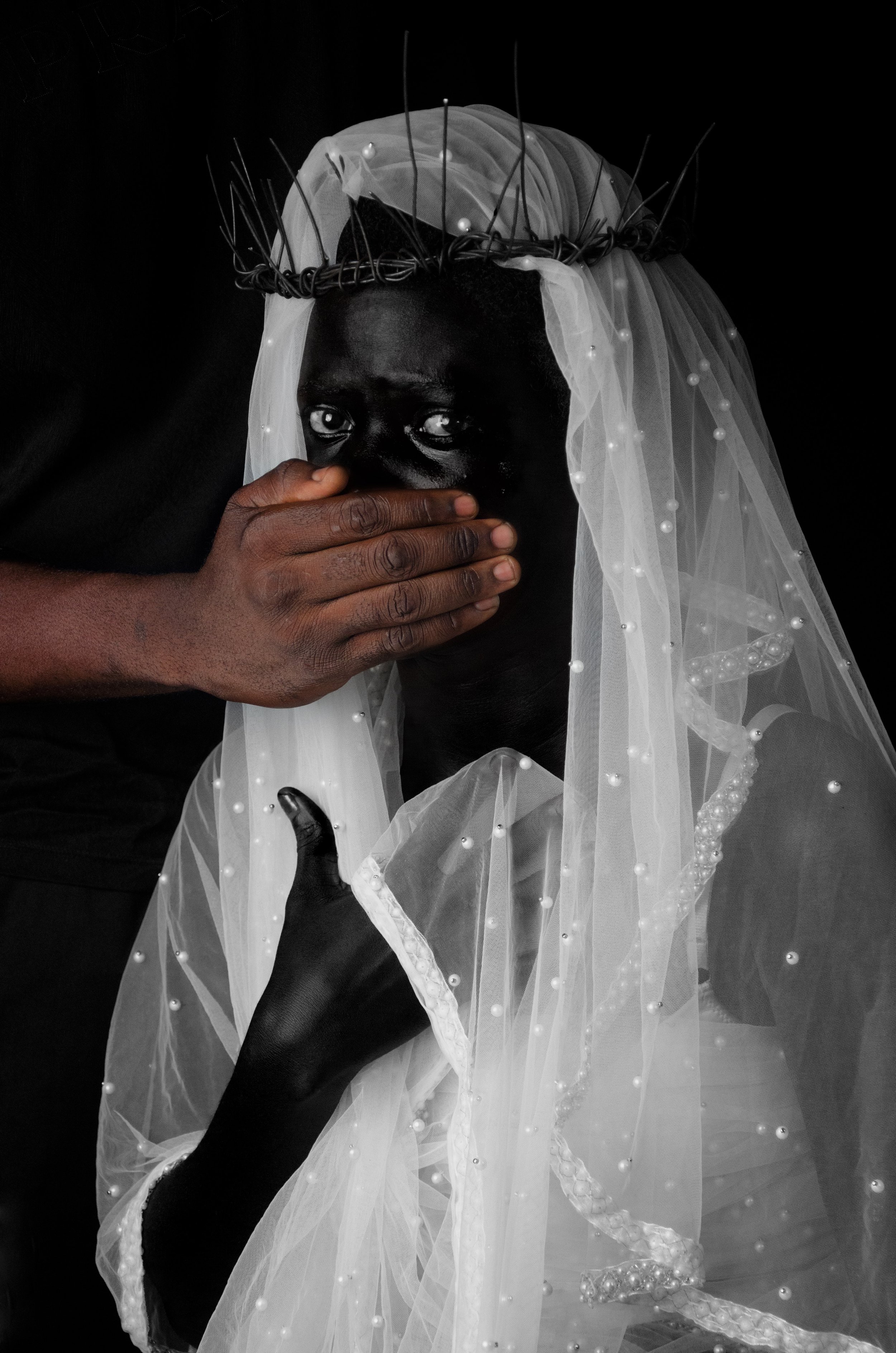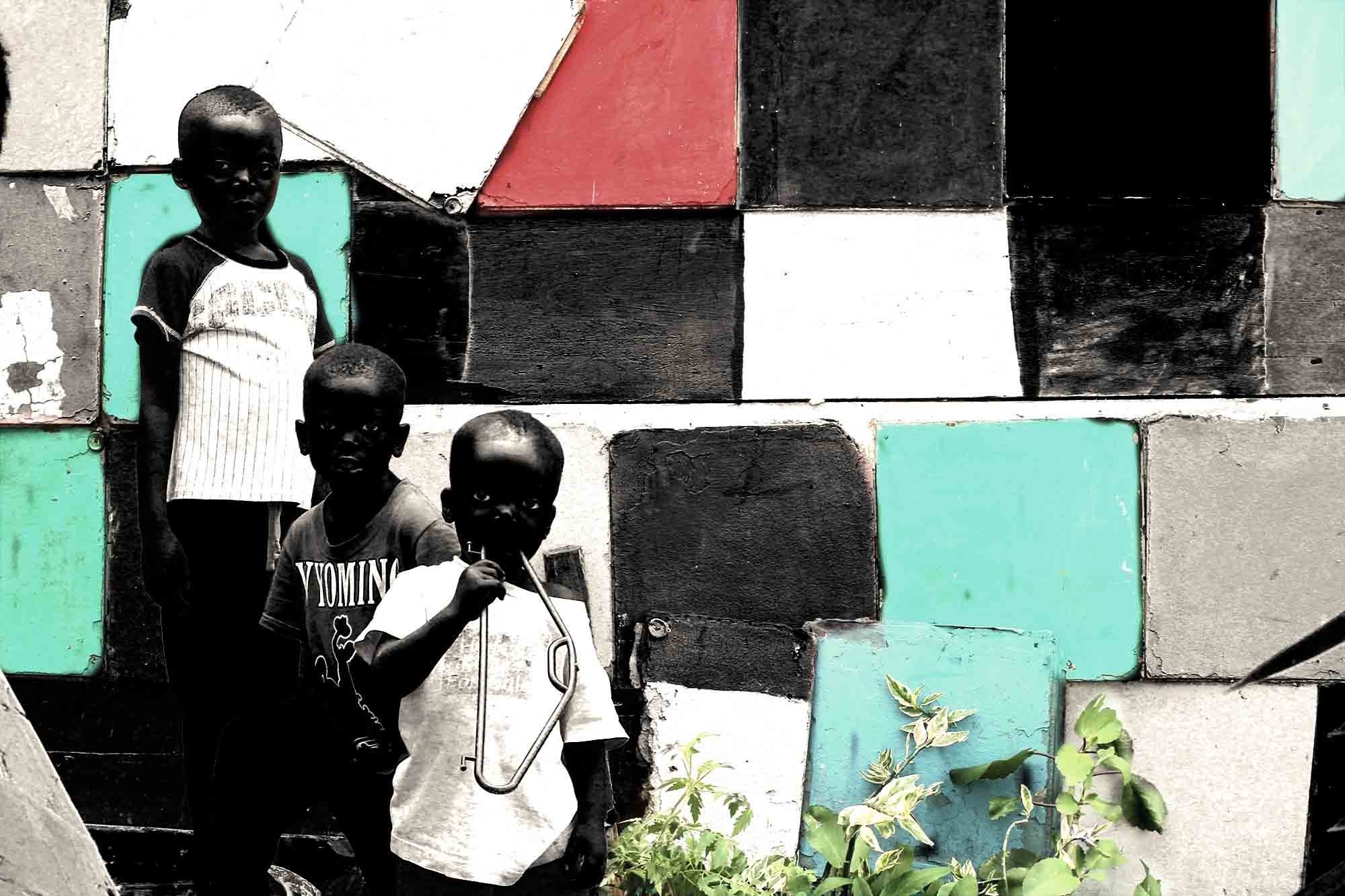In Conversation : Anastasie LANGU LAWINNER or the Embodiment of Resilience
Born in 1992, Anastasie LANGU LAWINNER is a self-taught photographer and activist from the Democratic Republic of Congo. Using imagery as a tool, she gives a face to injustice, both the struggles faced by women and those experienced in her homeland, which she left two years ago. Through striking, contrasting images, Anastasie LANGU LAWINNER charts her destiny, convinced that it is her prophecy.
Anastasie LANGU LAWINNER
In this interview, Anastasie Langu Lawinner shares her journey, marked by an unwavering determination to succeed in the face of adversity. She recounts her beginnings and her path to France in 2022. Through her intense and intimate work, Anastasie invites us to look at our realities without embellishment, with raw sincerity.
Ngalula MAFWATA: What are the early influences that shaped your beginnings?
Anastasie LANGU LAWINNER: I have been a visual artist for eight years, starting as a self-taught photographer. My interest began in 2016, after visiting the studio of a musician friend who owned a camera. Intrigued, I wanted to understand how it worked and learn more about photography. However, since I hadn’t studied the field, it was difficult to find anyone to teach me. I was even discouraged from pursuing it seriously. These rejections, however, only strengthened my resolve: feeling rebellious, I decided to teach myself, exploring and learning through online resources. At that time, I saw photography as a playground, a discovery without constraints. I shared some of my photos online, without any real intention, simply guided by my instinct and enjoyment. My law school friends, intrigued, often asked me questions, but I remained evasive, still in the midst of exploration. I am immensely grateful to my musician friend, who lent me my first camera and supported me by providing equipment as I made progress.
The photographer then embarked on a journey of exploration, sharing her advancements online. One day, she posted a new series of photos that she felt were different. It became a confirmation when a friend encouraged her to participate in a call for projects for a workshop, which she won to her great surprise. There, she met photojournalist Joseph MOURA, who would support her during this period, kindly inviting her to reflect on her motivations and artistic approach.
“At the beginning, I had chosen law to do pro bono work and defend people with limited access to the judicial system. Joseph MOURA encouraged me to transfer this desire to defend others into my artistic work—not behind the bar, but behind the lens. He strongly urged me to delve deeper into the idea behind this series of photos and turn it into the subject of an exhibition.”
Unfortunately, the exhibition would not take place, but the seed had been planted in the photographer’s mind. Anastasie LANGU continued her research and areas of focus, while also creating several photo series.
Ngalula MAFWATA: Creation often arises from an idea or an experience. In your case, you have always had this instinct to defend those who suffer injustice. Is this a fight you’ve personally experienced? Because, while we all witness it daily, few actually engage in it.
Anastasie LANGU LAWINNER: I believe we have to be born with this instinct; it can’t be forced. Being a leader, an activist, or an advocate is something that comes naturally. Not everyone has the heart to care about what others are going through. This was burning inside of me, but I didn’t yet have the means nor the profession to express it. It was through my encounter with photography that this aspect of my personality was revealed. I was born this way.
Ngalula MAFWATA: Black and white are omnipresent in your photos…
Anastasie LANGU LAWINNER: Aesthetics are at the core of my images. I love contrasting black and white; sometimes the black dominates, and I add color. It’s my way of expressing myself. I might create nuances between the hand covering the woman's mouth to show the oppressive hand and the darker figure of the woman in the background to indicate a difference, or the woman might be in black to express the discomfort of her position. These nuances help in reading the image.
Anastasie LANGU LAWINNER
Ngalula MAFWATA: What about women?
Anastasie LANGU LAWINNER: The first subject of my work is myself. I externalize my emotions. As women, we are often used to feeling like we always have to do more. Even in the artistic world, which is dominated by men, women feel the need to prove their worth. When I first entered photography, I felt like I was not wanted in this space, especially since I was not trained nor graduated from the Fine Arts. As a woman, as soon as you try to do more, it becomes unsettling. What I express is common to many women. For example, my series Voile shows a woman suffering from injustices and discrimination, hidden behind elements that gnaw at and destroy her.
I have lived through these experiences. I’ve had to face uncomfortable situations and limitations because society, my surroundings, and my family made it clear there were boundaries I shouldn’t cross as a woman: you must get married, have children, and not try to be a leader or excel in what you do. This dark side of a woman’s life is what I wanted to highlight with this series.
Ngalula MAFWATA: Do you still perceive these external limitations ?
Anastasie LANGU LAWINNER: Of course, but in a different form, almost like censorship. Now that I am an immigrant in France, the limitations might seem less important in comparison, but I would say they’ve simply taken on a new form.
Ngalula MAFWATA : You have touched on sensitive topics in your recent exhibition Ngayi such as war and the fate of women, what has been your drive behind it ?
Anastasie LANGU LAWINNER: Ngayi is a project that encompasses all of my work around women, and with the resumption of the war in the east, I felt the need to pay tribute to these women. I wanted to show the world that the situation in my country is unbearable, that women are used as weapons of war, through rape. Women, and also children, together, are the first victims of war. These women must survive; they have no choice, but their right to live peacefully has been taken from them. With this exhibition, I wanted to question and denounce the current situation in my country. It’s a reality that deeply disturbs me, and I can’t even imagine what those on the ground are going through, who have been enduring this war for thirty years now.
Anastasie LANGU LAWINNER
Anastasie LANGU LAWINNER
Ngalula MAFWATA: Photography is an intimate art. How do you manage to build trust with the people you capture ?
Anastasie LANGU LAWINNER: There are a lot of self-portraits in my photography, and the people I photograph are generally part of my inner circle, whether they are close family or friends. I understand that it is not easy to expose a part of your body let alone show your face in a context of violence. The people I photograph have sometimes experienced these situations themselves or wish to contribute to shedding light on these issues. Trust is essential. And if I don’t find it, I become my own subject! Laughs
Ngalula MAFWATA: Using yourself as a subject requires a certain letting go…
Anastasie LANGU LAWINNER: When I photograph myself, it is a performance; I listen to my soul and my emotions. If I want to cry or be sad, I let myself. I surrender to the emotions of the woman I want to embody.
Anastasie LANGU LAWINNER
Ngalula MAFWATA: Environment can have a strong impact on creation. How have you articulated your aesthetic since arriving in France? Are there elements you've left behind in Congo, or have you brought them with you to France, and vice versa?
Anastasie LANGU LAWINNER: My inspiration was cut off when I arrived in France. I felt like my connection had suddenly been severed, and for a while, I had no inspiration. I had to adapt to this new country and its daily realities, which require concrete solutions. All these challenges slowed my creativity at first, but now, after two years in France, things are getting better. I'm in a new phase where I’m starting to see how to adapt my creations to my new environment. In Africa, I find there’s greater diversity. Whether in Bas-Congo or Kinshasa, my photos would tell a different story. In France, I sometimes feel limited, but I’m starting to draw new inspirations and sources of creativity, especially through mixed media, which I’ve begun to explore.
Ngalula MAFWATA: What made you decide to explore the city of Moanda through photography, and how does your work shed light on the contrasts and injustices you've observed there?
Anastasie LANGU LAWINNER: My father is from Congo Central, a region I particularly love for its beauty and the river. When you go to Moanda, it's a ghost town. The people live in an area rich in oil, with many multinational companies present, yet life there is almost nonexistent. There’s no electricity; people depend on oil generators owned by these big companies, and they live in great poverty despite the wealth surrounding them, the oil giants, and the banks. The population doesn't benefit from these resources in any way.
The Mangrove Hotel, once a five-star establishment, has been in ruins since the colonizers left. You can feel the presence of life from the past, but this calmness leaves a sense of emptiness. That's why I wanted to explore this place through photography, rather than engage in direct activism, which can be risky, as the locals informed us.
I want to extend this series with a second part, this time involving the people of Moanda. The situation in Moanda deeply affected me, especially when comparing it with the neighboring city of Cabinda (Angola), which, with the same resources, managed to find balance and develop. Moanda is an example of a ruined city, marked by the remnants of colonization and abandonment.
Anastasie LANGU LAWINNER
Ngalula MAFWATA: What does the future looks like ?
Anastasie LANGU LAWINNER: I am passionate about always sharing my knowledge. In the past, I have mentored young people and individuals with disabilities, aiming to pass on skills and offer them the opportunity to access jobs, as society often ostracizes them. For me, it’s essential to give. Since arriving in Europe, I’ve invested in the Djiolifon project, which aims to create retreat spaces for artists, as well as activities for women.
Ngalula MAFWATA: What motivates you to keep pushing in your art and entrepreneurship every day?
Anastasie LANGU LAWINNER: I believe it's my vision, my prophecy. I always tell myself that I must reach a certain level, that this prophecy lives within me. It helps me face adversity because, as with any prophecy, there is also a struggle. When you know you are called to achieve great things, you must arm yourself and be ready to face obstacles like discouragement or fatigue. My prophecy helps me persevere during moments of doubt. Moreover, as a mother, I’m fortunate to have a supportive circle. Vision, prophecy, and self-belief are powerful forces. Believing in oneself is the key to success.
Find more about Anastasie LANGU LAWINNER on her personal spaces.











